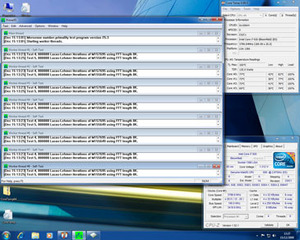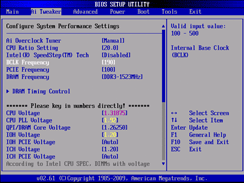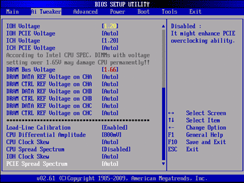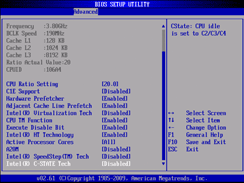Hitting 4GHz... and staying there?
Author: Richard SwinburneWe benchmarked the board at 4.2GHz - it was nice and stable in the few hours we ran benchmarks - but what about our hardcore stability test? Asus claims the board is "stable" to 4GHz - so we put the claims to the test as we loaded up the board with a Core i7-920 D0, 6GB of G.Skill 1,600MHz CL9 memory, a Corsair H50 CPU cooler, 750W PC Power and Cooling Silencer PSU, 1TB Seagate Barracuda 7200.12 hard disk and an ATI Radeon HD 5870. We loaded up Windows 7 Home Premium x64 with the latest updates before firing up Prime95 torture test on all cores, then rolling over 3DMark06 looping over the top to stress the graphics.
First of all we set the BIOS to 4GHz, using the following settings from Asus:
- vCore: 1.3825V
- CPU Uncore: 1.3V
- DIMM: 1.66V
- PLL: 1.96V
- IOH: 1.3V
- ICH: 1.3V
- CPU Clock Amplitude: 900mV
- Base Clock: 200MHz
- CPU Multiplier: 20x
- Memory Clock: 1,600MHz
- Loadline Calibration: Enabled
- Memory Timings: Auto
Unfortunately the system didn't last two minutes under Prime95 at these settings. We tried increasing the voltages in a hope to compensate it, but it had no effect. We dropped back the base clock and voltages accordingly to tone things down a nose - clocked at 3.7GHz the system was now stable and we just happened to catch the irradiated head from the Corsair H50 on an arm: WOW that was hot.
Clearly we'd forgotten that even though Intel CPUs can take their fair deal of heat, too much is still... well, it's still too much! A quick replacement of the default Corsair fan for something a little beefier and we changed our approach: minimum voltage, maximum effect.
 With BIOS settings:
With BIOS settings:- vCore: 1.3V
- CPU Uncore: Auto
- DIMM: 1.66V
- PLL: 1.92V
- IOH: 1.20V
- ICH: Auto
- CPU Clock Amplitude: 800mV
- Base Clock: 190MHz
- CPU Multiplier: 20x
- Memory Clock: 1,520MHz
- Loadline Calibration: Enabled
- Memory Timings: Auto
Conclusions
Custom PC gave the P6TD Deluxe a Premium Grade award and at bit-tech we'd give it the same recommended stamp as well - just like the original P6T Deluxe. Asus may have been lazy with not refining the layout after removing bits, but the subtle upgrades and tweaked BIOS seem to do it justice, as it's clearly an X58 performance leader. Perhaps our main issue with attempting to 4GHz was the amount of voltage our CPU needed, which may be because it's an early, engineering sample. While the Corsair H50 is a powerful LGA1366 CPU cooler, and even that was stretched to its limits with the voltage we used. We weren't able to obtain the 4GHz Asus challenged us to, which seems a clear indication that, as we always say with overclocking - your mileage may vary.
MSI MPG Velox 100R Chassis Review
October 14 2021 | 15:04












Want to comment? Please log in.